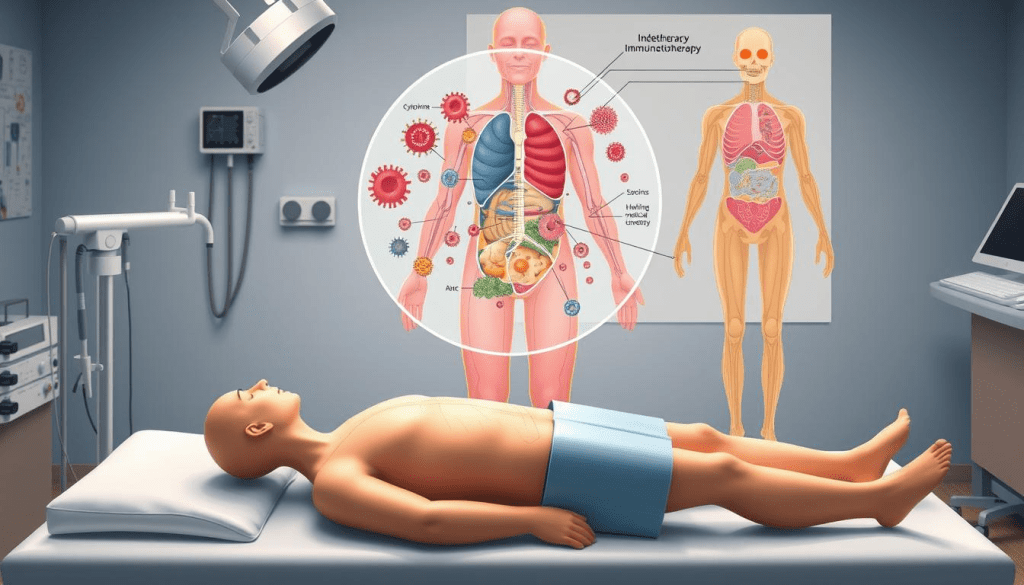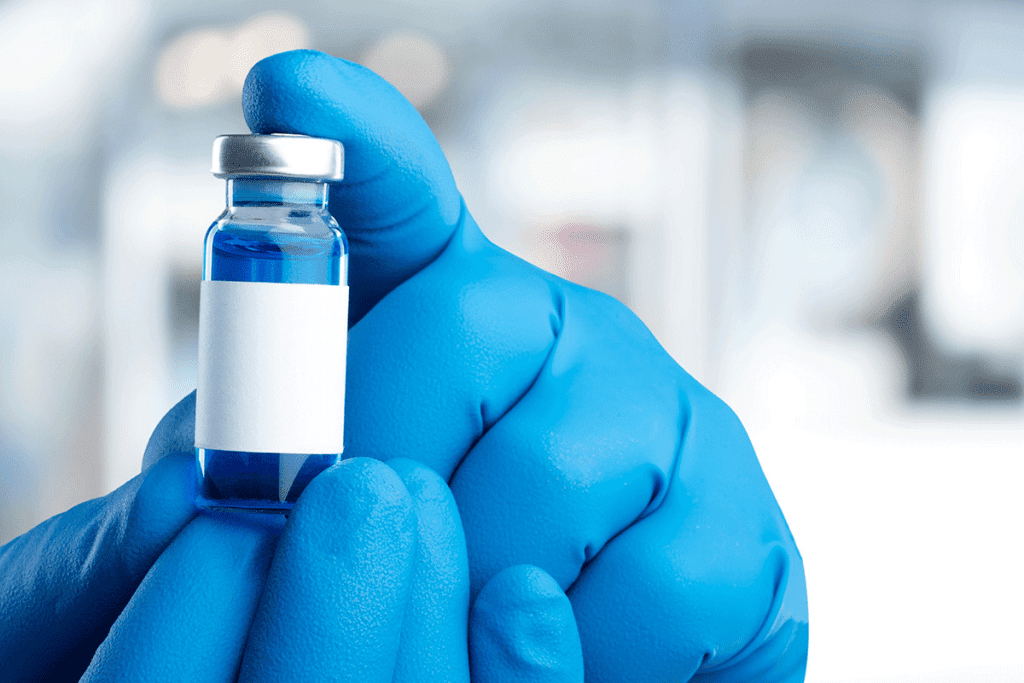Last Updated on October 21, 2025 by mcelik
Get the nutrition facts. Learn what you should avoid and what are the best foods to boost immune system during chemo and immunotherapy treatments.
Immunotherapy is a cancer treatment that uses our immune system to fight cancer. It boosts our body’s defenses to better attack cancer cells. But, some activities, conditions, and medicines can affect its work.
To get the most from immunotherapy, knowing what’s okay and what’s not is key. A healthy diet is very important for our immune system. The American Society of Clinical Oncology (ASCO) says a balanced diet helps cancer patients on immunotherapy.

We’ll look at how a healthy diet helps during immunotherapy. We’ll also talk about foods that boost our immune system. By choosing wisely, cancer patients can reduce risks and get better results from their treatment.
Immunotherapy is a new way to fight cancer. It uses your body’s immune system to attack cancer cells. This method helps your body defend itself better against cancer.
Immunotherapy trains your immune system to find and kill more cancer cells. There are different types, like checkpoint inhibitors and monoclonal antibodies. The National Cancer Institute says it’s a promising treatment for many cancers.
Immunotherapy needs certain rules to keep you safe. If you have asthma or autoimmune diseases, you might need to follow special guidelines. Sticking to these rules helps make the treatment work better and safer.
Not following immunotherapy rules can lead to serious problems. Studies show that ignoring guidelines can cause more side effects. For example, not following the rules can lead to more severe side effects.
Here are some key statistics:
Understanding immunotherapy and its rules helps you manage your treatment better. Always follow the guidelines and talk to your doctor. This way, you can get the best results from your treatment.
Immunotherapy’s success and safety can be affected by existing health conditions. Some health issues might make treatment harder or raise the chance of bad side effects. Studies show that about 30% of bad reactions to immunotherapy come from not following treatment well or having uncontrolled health problems.
For those with uncontrolled asthma, immunotherapy is a big concern. The British Society for Allergy & Clinical Immunology says that not well-managed asthma is a main reason to avoid immunotherapy. People with severe asthma face a higher risk of breathing problems during treatment.

Autoimmune diseases, where the body attacks its own tissues, can get worse with immunotherapy. This can lead to more flare-ups or other problems. It’s important to manage these diseases before starting immunotherapy to lower risks.
Having active or recent cancers can also affect whether you can have immunotherapy. The presence of other cancers might mean changing the treatment plan or finding a different way to treat. It’s key to check the patient’s cancer history to decide the best treatment.
Eating well is important for cancer patients getting immunotherapy. Good nutrition, including the right juices for chemo patients, is a big part of the treatment plan.
When you’re on immunotherapy, it’s key to know which medicines to avoid or use carefully. Some drugs can mess with immunotherapy, causing bad side effects or making it less effective. We’ll talk about the medicines to steer clear of during immunotherapy, focusing on how different medicines interact.
Beta-blockers help with high blood pressure and heart issues. But, they’re not recommended with immunotherapy because they might hide or make an allergic reaction worse. Always check with your doctor before starting or continuing beta-blockers with immunotherapy.
ACE inhibitors are used for high blood pressure and heart failure. But, they can cause issues with certain immunotherapy drugs. Tell your doctor if you’re taking ACE inhibitors.
Other medicines might need careful use during immunotherapy too. Corticosteroids, for example, can weaken the immune system, which might lessen immunotherapy’s effect.
“Careful management of concomitant medications is key to safe and effective immunotherapy,”
as guidelines in oncology stress.
To keep treatment safe, patients should:

Knowing the rules about medicines during immunotherapy and working with your healthcare team can help. This way, you can avoid risks and get the most from your treatment. It’s also important to think about the best ways to boost your immune system, like whether Chobani is good for you during treatment.
Keeping a healthy lifestyle is key for those on immunotherapy. A balanced lifestyle boosts treatment success and helps manage side effects.
Patients should keep up with their usual activities but with caution. Gentle exercises like yoga or short walks are good. But, it’s important to not push too hard. Talking to a healthcare provider about exercise plans is a good idea.
Traveling with immunotherapy is doable but needs careful planning. Always check with your healthcare provider before traveling, if your immune system is weak. It’s also important to have access to medical care where you’re going.
It’s wise to stay away from crowded places and people who are sick during treatment. Simple steps like washing hands often and wearing masks can help prevent infections.
| Lifestyle Factor | Recommendation |
| Physical Activity | Gentle exercises, avoid overexertion |
| Travel | Consult healthcare provider, plan for medical access |
| Infection Exposure | Avoid crowds, practice good hygiene |

Eating well is key to keeping your immune system strong during chemotherapy and immunotherapy. A healthy diet helps your body fight cancer and recover from treatment side effects.
Chemotherapy and immunotherapy are two different cancer treatments. They affect the body differently, so your diet needs to change. Chemotherapy requires bland, easy-to-digest foods. Immunotherapy, on the other hand, needs foods rich in nutrients to boost your immune system.
The National Cancer Institute (NCI) says a healthy diet is vital for cancer patients. Foods like fruits, vegetables, and proteins are great. They give your body the vitamins, minerals, and antioxidants it needs to fight off infections.
Adding immune-boosting foods to your diet is easy. Here are some good choices:
A study in the Journal of Clinical Oncology found that eating lots of fruits, vegetables, and whole grains can lower cancer risk.
“The relationship between diet and cancer is complex, but evidence suggests that a healthy diet can play a critical role in cancer prevention and treatment.”
| Food Group | Examples | Benefits |
| Fruits | Berries, citrus fruits | Rich in vitamins and antioxidants |
| Vegetables | Leafy greens, broccoli | High in vitamins and minerals |
| Protein-rich foods | Lean meats, fish, eggs | Support immune function |
In summary, a balanced diet with immune-boosting foods is essential for cancer patients on chemotherapy and immunotherapy. Knowing what foods to eat can help manage your condition and improve your health.
Certain foods can affect how well immunotherapy works. They might also increase side effects. Knowing which foods to avoid is key to getting the most from your treatment.
Some foods can change how immunotherapy drugs work. For example, foods rich in antioxidants like berries and leafy greens might interact with certain drugs. It’s important to talk to your healthcare provider about your diet to avoid any bad interactions.
When you eat can also matter. Some people find eating a light meal or snack before treatment helps with side effects. But, what’s best for you depends on your specific treatment.
Alcohol and caffeine can also interact with your treatment. Alcohol can make some side effects worse, and caffeine might not mix well with certain drugs. It’s best to check with your healthcare provider about how much to drink.
Being careful with your diet can help your immunotherapy work better. Always get advice from your healthcare provider on what to eat.
A well-balanced diet is key for cancer patients on immunotherapy. It supports the body and helps manage side effects. We’ll look at what a healthy diet includes, like nutritional guidelines, protein drinks, and staying hydrated.
Cancer patients need a diet full of nutrients to stay strong and boost their immune system.
| Food Group | Examples | Benefits |
| Fruits | Apples, Berries, Oranges | Rich in vitamins and antioxidants |
| Vegetables | Broccoli, Spinach, Carrots | High in fiber and essential nutrients |
| Protein Sources | Chicken, Fish, Legumes | Supports muscle strength and repair |
Protein is important for cancer patients to repair tissues and keep muscles strong. Protein drinks and supplements are helpful, like Ensure and Boost. They’re good when eating solid foods is hard.
Drinking enough water is critical for cancer patients on immunotherapy. It helps remove toxins and keeps the body working right. Drink lots of water, clear broths, and electrolyte-rich drinks. Avoid caffeinated and sugary drinks that can dehydrate you.
In summary, a healthy diet for cancer patients on immunotherapy should be balanced. It should include enough protein and keep you hydrated. Making smart food choices can help support your treatment and health.
Immunotherapy is a complex treatment that needs careful thought for special groups. This includes pregnant women, children, and the elderly. The National Cancer Institute (NCI) stresses the importance of tailored treatments for these groups.
Immunotherapy is usually not started during pregnancy. This is because it could pose risks to both the fetus and the mother. Pregnant women or those planning to get pregnant should talk to their healthcare provider about the risks and benefits.
For kids under five, immunotherapy is often not advised. This is because there’s not enough data on its safety and effectiveness in this age group. Parents should talk to a pediatric oncologist to find the best treatment option.
Elderly patients on immunotherapy need close monitoring. This is because they might have other health issues and their bodies change with age. It’s important for elderly patients to work closely with their healthcare team to manage any side effects and adjust their treatment as needed.
| Population | Immunotherapy Considerations |
| Pregnant Women | Not typically recommended; discuss risks and benefits with healthcare provider |
| Children Under Five | Generally not recommended; consult pediatric oncologist |
| Elderly Patients | Requires careful monitoring; manage side effects and adjust treatment plan as needed |
Understanding these special considerations helps us give the best care to patients on immunotherapy. A balanced diet rich in nutrients is key for those undergoing cancer treatment, including immunotherapy. The best foods to eat during chemotherapy also apply to immunotherapy, focusing on whole, nutrient-dense foods.
Managing side effects without banned meds is a big challenge for immunotherapy patients. It’s key for treatment success and the patient’s quality of life.
Patients can use safe ways to handle common side effects. Eating a good diet for cancer patients full of nutrients helps. Also, drinking the best juice for chemo patients keeps them hydrated.
| Side Effect | Management Strategy |
| Fatigue | Rest, gentle exercise, and nutritional supplements |
| Skin Rash | Topical creams, avoiding irritants, and keeping the skin moisturized |
| Gastrointestinal Issues | Dietary adjustments, anti-nausea medication alternatives, and hydration |
Knowing when to seek medical help for side effects is important. Patients should call their healthcare provider for severe or lasting side effects.
Some alternative therapies can help with immunotherapy. Options include acupuncture, meditation, and certain herbal supplements. But, always talk to your healthcare provider before trying new therapies.
To get the most out of immunotherapy, sticking to the treatment plan is key. Regular check-ups help doctors see how well the treatment is working. They can then make any needed changes.
Following your immunotherapy plan is very important. Not following it can make the treatment less effective and increase risks. We help patients understand why it’s so important to stick to their treatment.
Keeping an eye on how you’re doing is critical. This includes:
Talking openly with your healthcare team is essential. Patients should share any side effects or concerns. Keeping accurate records helps make better care decisions. We stress the value of clear communication for the best results.
Knowing what not to do during immunotherapy is key for success. We’ve talked about how some health issues, medicines, and habits can affect treatment. By knowing these limits, patients can avoid problems and get the most from their treatment.
It’s also important to eat the right foods. People with bladder cancer should eat foods that help them, and those on chemo should choose foods that are good for them. A healthy diet boosts the immune system and overall health.
We suggest patients talk to their doctors to make a plan for their treatment. This way, they can handle the challenges of immunotherapy and get the best results. The National Cancer Institute says it’s vital to understand immunotherapy and how it works with other treatments.
Immunotherapy is a cancer treatment that uses your body’s immune system. It makes your immune system recognize and attack cancer cells.
Certain health issues, like uncontrolled asthma or autoimmune diseases, can make immunotherapy harder. It’s key to manage these conditions for safe treatment.
Yes, some medicines, like beta-blockers, can interact with immunotherapy. Always tell your doctor about any medicines you’re taking.
Be careful with physical activity, travel, and avoiding infections during immunotherapy. Taking precautions helps keep you healthy.
Eat foods that boost your immune system, like fruits, veggies, and whole grains. Avoid foods that might react with your treatment.
Yes, foods like grapefruit can interact with your treatment. Also, watch what you eat before and after treatment, and limit alcohol and caffeine.
Some protein drinks and supplements might help during immunotherapy. But, always check with your doctor first.
Yes, pregnant women, kids under five, and the elderly need special care during immunotherapy. They might need to follow different guidelines.
There are safe ways to handle side effects, like alternative therapies and lifestyle changes. Always talk to your doctor if you have side effects.
Keeping up with your treatment and regular check-ups are key for immunotherapy to work well. Always follow your doctor’s advice for the best results.
Chobani yogurt is a good choice for cancer patients because of its protein and probiotics. But, always talk to your doctor about the best foods for you.
Focus on foods full of nutrients, like fruits, veggies, whole grains, and lean proteins. Avoid spicy or fatty foods to help manage side effects.
Yes, foods like citrus fruits and berries can help your immune system during chemo. But, always check with your doctor for the best foods for you.
Bladder cancer patients should eat a lot of fruits, veggies, and whole grains. Foods high in antioxidants and omega-3s might also help. Always talk to your doctor about the best diet for you.
Subscribe to our e-newsletter to stay informed about the latest innovations in the world of health and exclusive offers!